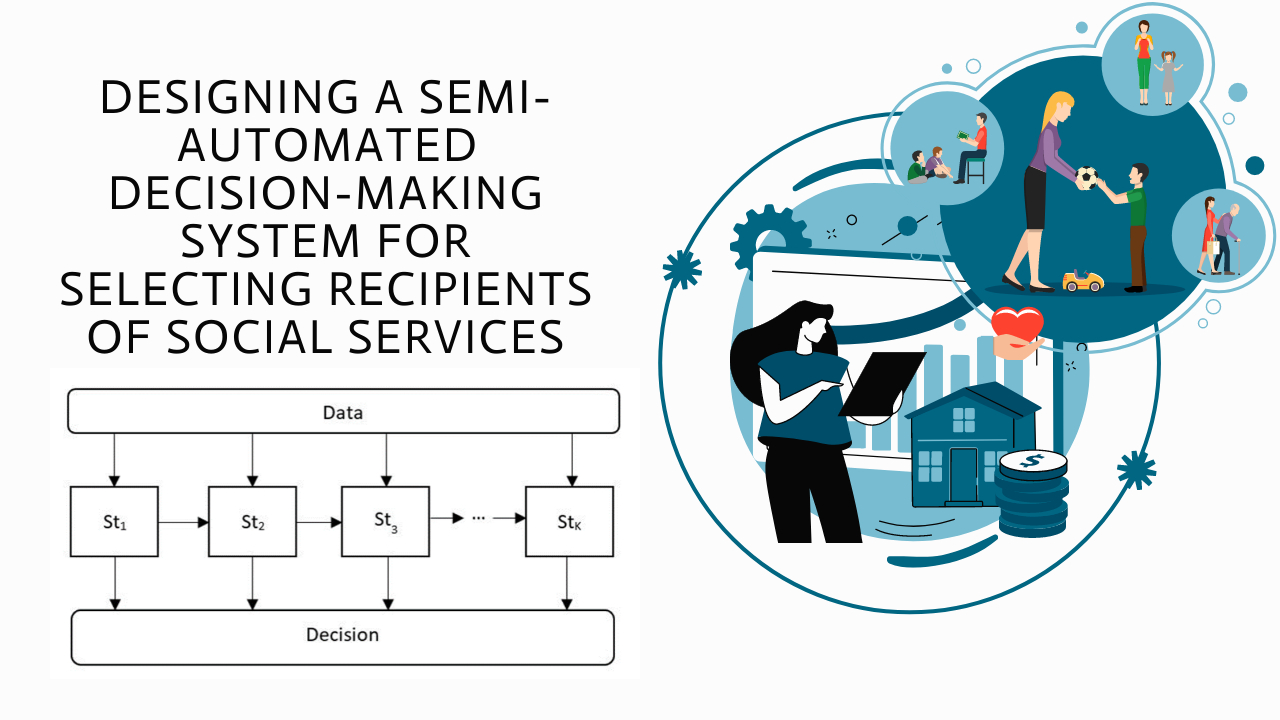Designing a semi-automated decision-making system for selecting recipients of social services
DOI:
https://doi.org/10.15587/2706-5448.2024.303763Keywords:
expert decision-making block, expert system, production rule, social sphere, social serviceAbstract
The object of this research is the decision-making process in the context of selecting recipients of social services using a semi-automated expert system. The main focus is on improving the mechanisms of assessment and selection of candidates eligible for assistance, in order to ensure a more efficient and objective allocation of resources.
The problem addressed in this study is the need to improve the accuracy and efficiency of decision-making processes in social services through the implementation of semi-automated systems. In particular, reducing subjective influence in selection processes, as well as reducing the time and resources required to process applications.
The study shows that the introduction of a semi-automated system can significantly reduce the response time to applications, increase the accuracy of candidate selection and ensure greater transparency in the decision-making process. The system, based on data analysis algorithms and production rules, is able to adapt to changing conditions and requirements, providing solutions based on up-to-date information.
The effectiveness of the semi-automated system is due to the use of modern technologies for processing large volumes of data and the use of complex mathematical models for the analysis of this data. The implementation of a modular system with individually adjustable parameters allows the system to accurately evaluate each case based on the expected criteria, ensuring a high level of adaptability and accuracy.
The results of the research can be applied in practice in various social security institutions, where there is a need to automate the processes of selection and decision-making. Important conditions for the effective implementation of the system are the availability of sufficient technical support, a high level of qualification of the personnel engaged in putting the system into operation, as well as a clear understanding of the rules and procedures that regulate social protection. In addition, to guarantee the successful application of the system, it is necessary to ensure compliance with all regulatory and legislative requirements, especially regarding the protection of personal data.
References
- Rijal, S. (2023). The Importance of Community Involvement in Public Management Planning and Decision-Making Processes. Journal of Contemporary Administration and Management (ADMAN), 1 (2), 84–92. doi: https://doi.org/10.61100/adman.v1i2.27
- Melati, C., Janissek-Muniz, R., Curado, C. M. M. (2021). Decision-Making Quality of Public Managers: Contributions from Intelligence and Knowledge Management. Revista de Administração Contemporânea, 25 (2). doi: https://doi.org/10.1590/1982-7849rac2021190044.en
- Mandinach, E. B., Schildkamp, K. (2021). Misconceptions about data-based decision making in education: An exploration of the literature. Studies in Educational Evaluation, 69, 100842. doi: https://doi.org/10.1016/j.stueduc.2020.100842
- Amalia, K., Komariah, A., Sumarto, S., Asri, K. H. (2020). Leadership in Education: Decision-Making in Education. 3rd International Conference on Research of Educational Administration and Management (ICREAM 2019). Atlantis Press, 134–137. doi: https://doi.org/10.2991/assehr.k.200130.155
- Saibene, A., Assale, M., Giltri, M. (2021). Expert systems: Definitions, advantages and issues in medical field applications. Expert Systems with Applications, 177, 114900. doi: https://doi.org/10.1016/j.eswa.2021.114900
- Wahyun, W. C., Sitio, A. S. (2020). Pest Detection Expert System And Method Using Bayes Rice Diseases. Journal Of Computer Networks, Architecture and High Performance Computing, 2 (2), 313–319. doi: https://doi.org/10.47709/cnapc.v2i2.411
- Charitonidou, M. (2022). Urban scale digital twins in data-driven society: Challenging digital universalism in urban planning decision-making. International Journal of Architectural Computing, 20 (2), 238–253. doi: https://doi.org/10.1177/14780771211070005
- Gómez, L. E. (2020). Spanish social service recipients. Encyclopedia of quality of life and well-being research. Cham: Springer International Publishing, 1–8. doi: https://doi.org/10.1007/978-3-319-69909-7_3736-2
- Hall, A. S. (2021). The point of entry: a study of client reception in the social services. Routledge, 150. doi: https://doi.org/10.4324/9781003197690
- Mulesa, O., Kachmar, O., Myronyuk, I., Horvat, P., Radivilova, T., Kykyna, Y. (2022). Designing Semi-Automated Decision-Making Expert Systems for Healthcare Tasks. 2022 IEEE 17th International Conference on Computer Sciences and Information Technologies (CSIT), 235–238. doi: https://doi.org/10.1109/csit56902.2022.10000448

Downloads
Published
How to Cite
Issue
Section
License
Copyright (c) 2024 Yevhenii Kykyna

This work is licensed under a Creative Commons Attribution 4.0 International License.
The consolidation and conditions for the transfer of copyright (identification of authorship) is carried out in the License Agreement. In particular, the authors reserve the right to the authorship of their manuscript and transfer the first publication of this work to the journal under the terms of the Creative Commons CC BY license. At the same time, they have the right to conclude on their own additional agreements concerning the non-exclusive distribution of the work in the form in which it was published by this journal, but provided that the link to the first publication of the article in this journal is preserved.







